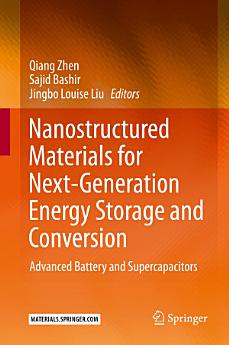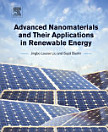Nanostructured Materials for Next-Generation Energy Storage and Conversion: Advanced Battery and Supercapacitors
About this ebook
This Volume focuses on the fundamentals related to batteries using the latest research in the field of battery physics, chemistry, and electrochemistry. The research summarised in this book by leading experts is laid out in an easy-to-understand format to enable the layperson to grasp the essence of the technology, its pitfalls and current challenges in high-power Lithium battery research. After introductory remarks on policy and battery safety, a series of monographs are offered related to fundamentals of lithium batteries, including, theoretical modeling, simulation and experimental techniques used to characterize electrode materials, both at the material composition, and also at the device level. The different properties specific to each component of the batteries are discussed in order to offer tradeoffs between power and energy density, energy cycling, safety and where appropriate end-of-life disposal. Parameters affecting battery performance and cost, longevity using newer metal oxides, different electrolytes are also reviewed in the context of safety concerns and in relation to the solid-electrolyte interface. Separators, membranes, solid-state electrolytes, and electrolyte additives are also reviewed in light of safety, recycling, and high energy endurance issues. The book is intended for a wide audience, such as scientists who are new to the field, practitioners, as well as students in the STEM and STEP fields, as well as students working on batteries. The sections on safety and policy would be of great interest to engineers and technologists who want to obtain a solid grounding in the fundamentals of battery science arising from the interaction of electrochemistry, solid-state materials science, surfaces, and interfaces.
About the author
Dr. Qiang Zhen has been the executive member of the China Instrument Function Material Society Council and directed projects funded by the National Science Foundation (China) and other funding agencies. His research interests focus on advanced energy materials and published more than half-a-century of peer-reviewed papers.
Dr. Sajid Bashir was elected as the Fellow of Royal Society of Chemistry, as well as Chattered Science and Chattered Chemist by the Science Council, due to his outstanding contribution to the STEM fields. He published close to a century of papers and directed projects supported by the National Institute of Health and other federal funding agencies. He served as the Chair of the South Texas American Chemical Society and executive officer in the ACS technical division.
Dr. Jingbo Louise Liu was elected as the Fellow of Royal Society of Chemistry, and DEBI Fellow of the US Air Force Research Laboratory due to her achievement in the development of nanomaterials used in energy fields. She published over a century of papers and served as the reviewers for multiple energy journals or funding agencies. She participated and directed 40 projects supported by the National Science Foundation (US and China), The Natural Sciences and Engineering Research Council of Canada. She was the 2018 Program Chair of the Energy and Fuels Division of the ACS.
All editors have been well-recognized as the expert in the fields and their contributions to the energy materials and systems are of high caliber.







